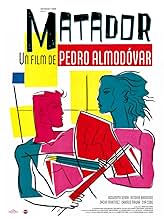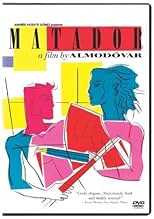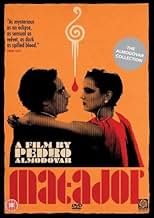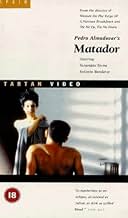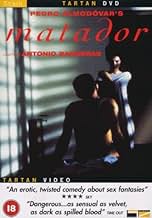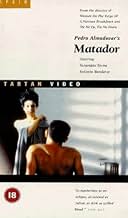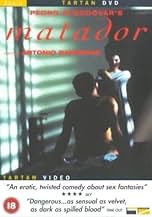A matador is wounded by a bull and can no longer kill in the arena. It is just one of the problems of one of the characters that unexpectedly collide in this film.A matador is wounded by a bull and can no longer kill in the arena. It is just one of the problems of one of the characters that unexpectedly collide in this film.A matador is wounded by a bull and can no longer kill in the arena. It is just one of the problems of one of the characters that unexpectedly collide in this film.
- Awards
- 6 wins & 7 nominations total
Nacho Martínez
- Diego
- (as Nacho Martinez)
Bibiana Fernández
- Vendedora Flores
- (as Bibi Andersen)
Verónica Forqué
- Periodista
- (as Veronica Forque)
Mercedes Jiménez
- Alumna 3ª
- (as Mercedes Jimenez)
Francesca Prandi
- Alumna 4ª
- (as Francesca Romana)
Featured reviews
Before I saw this movie in late 80-s I knew something about culture, tradition and 'spirit' of Spain, the country which inspired me for years. This movie made an enormous impression on me as it gave me very deep insight into 'real Spanish spirit', i.e. what does death mean to Spanish people in the light if their tradition and culture.
The personality of ex-matador and his behaviour underlined by his words - 'to stop to kill means to dye for me', on the other hand a high class woman being 'infected' with death, treating Diego as her God of Death, and these two 'lost worlds' slowly approaching each other into a fatal bitter end, which was filled with the most beautiful tune ever made (Esperame en el cielo mi corazon...) all this creates an unforgettable and distinctive impression after watching this movie.
Pedro Almodovar you gave us a great piece of art, I believe there are some more pictures that you can bring to us in the future.
Thanks Pedro..............
The personality of ex-matador and his behaviour underlined by his words - 'to stop to kill means to dye for me', on the other hand a high class woman being 'infected' with death, treating Diego as her God of Death, and these two 'lost worlds' slowly approaching each other into a fatal bitter end, which was filled with the most beautiful tune ever made (Esperame en el cielo mi corazon...) all this creates an unforgettable and distinctive impression after watching this movie.
Pedro Almodovar you gave us a great piece of art, I believe there are some more pictures that you can bring to us in the future.
Thanks Pedro..............
The connection between sex and death is not a novel one. Elizabethan poetry would occasionally use the latter as a metaphor for the former. Pedro Almodóvar's sixth feature is about three people who have erased the line between the two: Nacho Martinez, a matador gored in the ring, who now teaches students on the art; Antonio Banderas, one of his pupils; and Assumpta Serna, a lawyer defending Banderas who is charged with raping and killing two girls.
In other words, it's one of Almodóvar's movies about the weird kinks of the world. This time, however, he is not concerned with the people at the edge of Spanish society, but at the center of the normal world... assuming there is such a thing. We are all weird, we all act outside the norms, and the people we respect can be the most bizarre.
It's rather slow-moving for one of his movies, probably because this is not one of his shock comedies - although there are comic elements. Visually, it is sumptuous, with a focus on colors, particularly bright reds that draw one's eyes. Miss Serna is a sharp dresser, and she wears a cape in several scenes, which she whirls like a bullfighter going in for the kill.
Is Almodóvar decrying bullfighting? Or in favor of consensual activity of whatever sort? Has he simply presented his bizarre story, and left his audience to draw the moral conclusions it chooses? Or is this simply the sort of story he likes to tell? I think the last is true, but there's nothing simple about it.
In other words, it's one of Almodóvar's movies about the weird kinks of the world. This time, however, he is not concerned with the people at the edge of Spanish society, but at the center of the normal world... assuming there is such a thing. We are all weird, we all act outside the norms, and the people we respect can be the most bizarre.
It's rather slow-moving for one of his movies, probably because this is not one of his shock comedies - although there are comic elements. Visually, it is sumptuous, with a focus on colors, particularly bright reds that draw one's eyes. Miss Serna is a sharp dresser, and she wears a cape in several scenes, which she whirls like a bullfighter going in for the kill.
Is Almodóvar decrying bullfighting? Or in favor of consensual activity of whatever sort? Has he simply presented his bizarre story, and left his audience to draw the moral conclusions it chooses? Or is this simply the sort of story he likes to tell? I think the last is true, but there's nothing simple about it.
Matador is one of the strangest, darkest, (and yet compelling) early films from Spanish master filmmaker Pedro Amoldovar.
It is completely nuts.
Pour in equal measures of sadism, masochism, bullfighting, perverted sexuality, and sexual violence. Add in a splash of comedy and soupcon of star-crossed lovers (if, for a moment, you thought pairing Tybalt and Lady McBeth qualified as star-crossed) and you have what passes as characterisation. Mix dark nights with gaudy flamenco colours and you have some striking cinematography. I'll come to the plot in a minute
Amoldovar was clearly enjoying Spanish cinema's new-found, post-Franco sexual and artistic liberalism. The prudish among his audience might suggest he was positively wallowing in it. Whatever the truth, Matador is a masterpiece of his style, if not, indeed, a whole style in of itself.
The plot or possibly a better description, the tapestry over which the characters move is a murder hunt. Very few prizes will be won, however, for guessing the culprit/s. Two people are quickly in the audience's frame because they are shown er murdering people on camera. A third person (Banderas, in to my mind his best Amoldovar role) confesses to the murders in a fit of insecurity and remorse over an attempted rape ("some girls get all the luck" comments a female duty officer dryly, proving that feminism wasn't that big in Spain back in the 1980s). Nevertheless, the net soon closes on the crushingly obvious culprits (who in the meantime have developed quite a crush on each other). As previously mentioned, completely nuts.
Matador's strengths are in its characterisation and its sheer bare-facedness. Amoldovar has, as usual, assembled a character list of freaks and proceeded to humanise all of them to the point where there is a genuine whiff of tragedy in the final act. To mention the great performances is really to rehearse the cast list. Assumpta Serna, Nacho Martinez, Antonio Banderas and Eva Cobo are all excellent. And it really is worth seeing, just for the young Antonio.
There are some interesting points made in the film about outsiders, liberalism, sexual politics and gender politics (as always with Amoldovar). I'll let you pick through them. It is, though, not so much a film as a giant red rag to the raging bull of conservatism, deftly whisked aside to the ragged applause of an admiring, if somewhat perplexed, audience. A positive Jimi Hendrix of a film, unpolished, with some definite dud notes, but undeniably the work of a genius. 8½/ 10
It is completely nuts.
Pour in equal measures of sadism, masochism, bullfighting, perverted sexuality, and sexual violence. Add in a splash of comedy and soupcon of star-crossed lovers (if, for a moment, you thought pairing Tybalt and Lady McBeth qualified as star-crossed) and you have what passes as characterisation. Mix dark nights with gaudy flamenco colours and you have some striking cinematography. I'll come to the plot in a minute
Amoldovar was clearly enjoying Spanish cinema's new-found, post-Franco sexual and artistic liberalism. The prudish among his audience might suggest he was positively wallowing in it. Whatever the truth, Matador is a masterpiece of his style, if not, indeed, a whole style in of itself.
The plot or possibly a better description, the tapestry over which the characters move is a murder hunt. Very few prizes will be won, however, for guessing the culprit/s. Two people are quickly in the audience's frame because they are shown er murdering people on camera. A third person (Banderas, in to my mind his best Amoldovar role) confesses to the murders in a fit of insecurity and remorse over an attempted rape ("some girls get all the luck" comments a female duty officer dryly, proving that feminism wasn't that big in Spain back in the 1980s). Nevertheless, the net soon closes on the crushingly obvious culprits (who in the meantime have developed quite a crush on each other). As previously mentioned, completely nuts.
Matador's strengths are in its characterisation and its sheer bare-facedness. Amoldovar has, as usual, assembled a character list of freaks and proceeded to humanise all of them to the point where there is a genuine whiff of tragedy in the final act. To mention the great performances is really to rehearse the cast list. Assumpta Serna, Nacho Martinez, Antonio Banderas and Eva Cobo are all excellent. And it really is worth seeing, just for the young Antonio.
There are some interesting points made in the film about outsiders, liberalism, sexual politics and gender politics (as always with Amoldovar). I'll let you pick through them. It is, though, not so much a film as a giant red rag to the raging bull of conservatism, deftly whisked aside to the ragged applause of an admiring, if somewhat perplexed, audience. A positive Jimi Hendrix of a film, unpolished, with some definite dud notes, but undeniably the work of a genius. 8½/ 10
If you're a fan of Pedro Almodovar, you'll love this one from 1986.. filmed in Madrid, it has all the usual elements: offbeat characters who meet up and get even crazier, like atoms smashing together. when a young matador Angel (Antonio Banderas at 26) thinks his heroes have committed crimes, he confesses to them to take the fall. watch that opening scene.. .pretty rough stuff: (simulated) sex, nudity, and murder, all in one. his lawyer has her own kinky issues, and wants to defend Angel. Look for the usual Almodovar cast, with Carmen Maura and Chus Lampreave. Assumpta Serna is the sexy, flirty, over-sexed Maria. and the gory bullfights, which play a big part in the story. Secrets. everyone has their secret. which ones will come out? Liaisons... more secrets. will the police find the real killer(s)? it's very good. intrigue.
I am not sure what to expect when the opening scene is a man masturbating to torture porn, a term that was probably not even invented in 1988.
From there we go to alternating clips of Antonio Banderas asking the ex-bullfighter Nacho Martínez about women and he compares getting a woman to bullfighting, while we watch someone do exactly that. We are no, of course, prepared for the necrophilia twist in that encounter.
We find our boy, Antonio, and he is a boy in this film, in a strict Catholic household. I would have to guess that his mother was Opus Dei. He attempts to rape his neighbor and confesses to four murders which we know he did not do. This is just Almodóvar's take on religion and repression. He revisits that subjects again in the film, so it must me a theme for him.
But, then the story shifts to Nacho and Assumpta Serna, with Eva Cobo in a minor role. This is where the story gets interesting with the police trying to solve the four murders and the real murderers trying to lay it on Antonio.
It gets bizarre at the end with Antonio seeing the killers in his mind and leading the police to them. But, they arrive too late as the climax of sex and death occurs simultaneous with an eclipse. How weird is that?
From there we go to alternating clips of Antonio Banderas asking the ex-bullfighter Nacho Martínez about women and he compares getting a woman to bullfighting, while we watch someone do exactly that. We are no, of course, prepared for the necrophilia twist in that encounter.
We find our boy, Antonio, and he is a boy in this film, in a strict Catholic household. I would have to guess that his mother was Opus Dei. He attempts to rape his neighbor and confesses to four murders which we know he did not do. This is just Almodóvar's take on religion and repression. He revisits that subjects again in the film, so it must me a theme for him.
But, then the story shifts to Nacho and Assumpta Serna, with Eva Cobo in a minor role. This is where the story gets interesting with the police trying to solve the four murders and the real murderers trying to lay it on Antonio.
It gets bizarre at the end with Antonio seeing the killers in his mind and leading the police to them. But, they arrive too late as the climax of sex and death occurs simultaneous with an eclipse. How weird is that?
Did you know
- TriviaOne of the films that Diego Montes is masturbating to in the Opening Sequence is Mario Bava's Blood and Black Lace (1964).
- Quotes
Francisco Montesinos: I've told you not to shoot up in the dressing rooms!
- ConnectionsFeatured in Playboy: The Story of X (1998)
- How long is Matador?Powered by Alexa
Details
- Release date
- Country of origin
- Official sites
- Language
- Also known as
- 鬥牛士
- Filming locations
- Viaducto de Segovia, Madrid, Spain(Bridge where Maria and Diego talk.)
- Production companies
- See more company credits at IMDbPro
Box office
- Gross US & Canada
- $279,394
- Opening weekend US & Canada
- $13,399
- Aug 13, 2006
- Gross worldwide
- $286,126
Contribute to this page
Suggest an edit or add missing content

